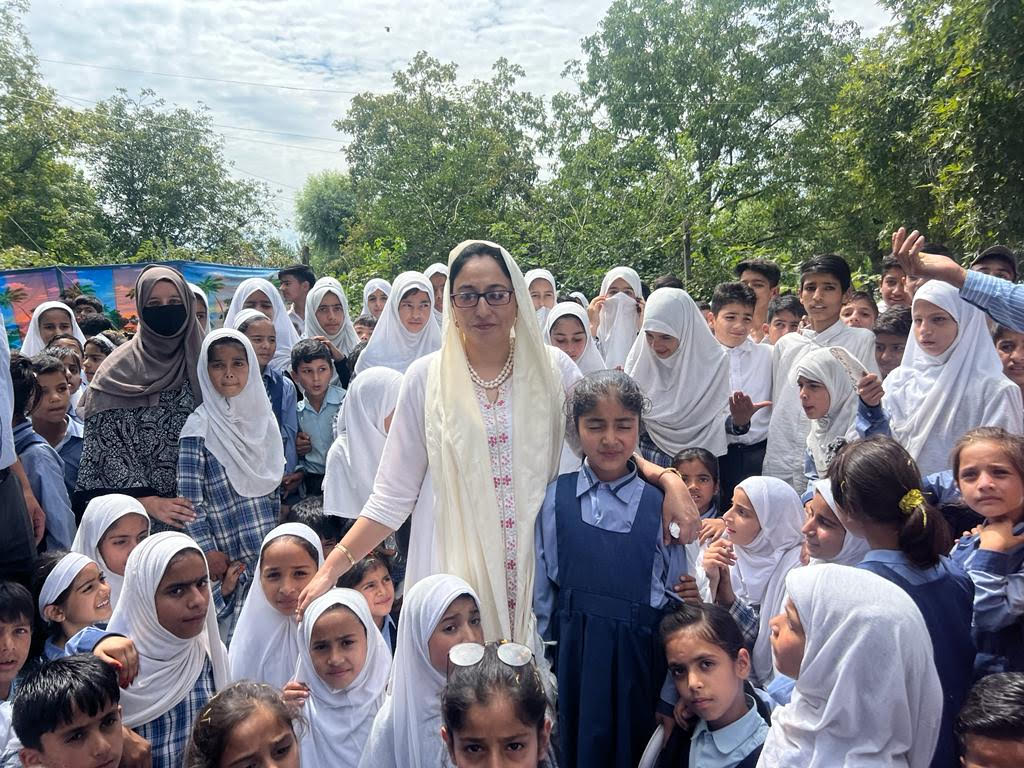.webp)
Ehsan Fazili/Srinagar
The recent order of the J&K Waqf Board imposing a ban on receiving donations forcibly through exploitative means by the Mutawalis (caretakers) at shrines, is aimed at streamlining the revenue generation of the religious places and diverting the money for public institutions and improving the infrastructure and conveniences at these place.
Though the move is being resented by the Mutawalis, the hereditary caretakers, who once looked after the shrines and lived off the donations made by the devotees, Darakshan Andrabi, the first woman chief of the J&K Waqf Board says this step has been taken on complaints from the public.
The ban order has come into force on August 18. Public notices have been placed in all the shrines and Mosques asking the devotees to not pay money to anyone inside the premise. Helpline numbers are displayed at all the places in case someone coerces them into paying money.
Darakshan Andrabi remains unmoved by Mutawali’s protests. She said, "Those doing politics on Waqf won't get anything. 99% of people have supported the move of Waqf Board to stop forced donations and bring accountability."
On the day the ban came into force, Andrabi was visiting the shrine of Sheikh Nooruddin (Wali) Noorani at Chrar-e-Sharief, in central Kashmir. She ordered the removal of paraphernalia – chairs, takhts - set up by Mutawalis. These were like the shops set up for offering cures to visitors’ woes and problems in life, something that Islam doesn’t approve of.

Darakshan Andrabi among students of a school run by J&K Waqf Board
“The ban on illegal and forced donations and occupation of the donation spaces by individuals in shrines is a nuisance and people across J&K have been demanding the abolition of this practice for decades but Waqf was used by politicians for decades for vote bank politics and now we have taken this very important decision as per the provisions of Central Waqf Act. We aim to provide a clean, serene, and spiritually befitting atmosphere to visitors in all shrines,” Andrabi said.
The Waqf chief who has been visiting shrines all over the region, said “These shrines are our spiritual centers and we have to ensure the dignity of these shrines and the saints with whom these shrines are associated. The mass acceptance of our measures speaks volumes about the errors which existed within the system.”
On Mutawali’s complaints, she said only a few people were opposing and shouting in the media against these moves to correct the errors because of their interests.
“Waqf is not for a few people but all. Decisions to streamline the working of Waqf has annoyed a few but assured the majority of accountability and we will not allow Waqf to remain a business enterprise for a selected few,” she said.
The ban order explains the reason for this move. It says: “Despite coming from a reasonably sound economic background, such people were permanently occupying particular spots within the shrines for their activities, and there are instances when such spots are being outsourced or contracted out against receipt of large sums of money that violates the sacrosanctity of the Ziyarats. Such unethical practices damaged the sanctity of such sacred places, and were detrimental to the already strained finances of the J&K Waqf Board”.
The order said the “pilferages” are severely limiting the ability of the Waqf Board to perform basic duties of charity and carry out activities for the upliftment of the poor and disadvantaged groups of the society, and also limit the ability of Waqf to provide different facilities to the devotees and carry out infrastructural improvements at the Shrines” the order stated.
Also Read: Lashkar terrorist gets Army jawans' blood to survive
Kashmir has plenty of Muslim shrines including Hazratbal where a relic of Prophet Mohammad is kept and once upon a time these were taken care of by Mutawalis. They lived off the donations and offerings of pilgrims in lieu of the special prayers (Khatmaat wa Moazzamat) for prosperity, good health, education, other worldly desires, end to difficulties and miseries, and seeking favours from Allah in this world and hereafter.
The famous shrines in the valley include Ziyarat of Peer Dastgeer Sahib in Srinagar, Sheikh Nooruddin Noorani at Chrar-e-Sharief, Makhdoom Sahib at Kohi Maraan or Hari Parbat in Srinagar, and Ziyarat of Zainuddin Wali at Aishmuqam in Anantnag district of South Kashmir.
Each shrine has its significance like Muslims prefer to shave off the first hair of their newborn at the shrine of Nooruddin Noorani at Chrar-e-Sharief. It is mainly on these occasions or the special prayers offered by these Mutawalis for the devotees that the offerings and donations are made.
The J&K Waqf has over 32,000 properties in the shape of shrines, mosques, educational institutions, land, and shops. “Our forefathers have been running the shrines, as Imams, trustees, and caretakers for four centuries without salary”, said one of the affected caretakers. They said that the concerned were not taken into confidence.
